
Because the Japanese school system isn’t going to teach them how to say “The set list is lit!”
If you’re learning a foreign language, pretty much any entry-level class or textbook will teach you the basic words and phrases for talking about things like food, clothing, and transportation. Get into higher levels, and they’ll cover scientific, economic, and political terminology too.
But what’s tricky is finding a resource for learning about niche topics like specific hobbies, which is where English for Oshikatsu comes in. Japanese publisher Gakken has designed the book to provide Japanese otaku and fujoshi with the skills the need to talk about their passion for anime, games, and idols, including their oshikatsu, or activities for supporting their oshi (favorite character or performer).
The book’s focus is on words and phrases used in fan-to-fan conversations and social media posts, especially casual and slang phrases that aren’t likely to be introduced in classroom instruction, like “I cleaned and rearranged my merch altar,” “Let’s take photos of the plushies,” and “My fave looks happy, and that’s all that matters.”
Incidentally, this means that the book can also be used by English-speakers who want to learn how to talk about otaku subjects in Japanese, as long as you can determine the readings for the Japanese text.
▼ For example, here we can see that an offline meet-up among online friends is called an ofukai, and that the trendy way to say “plushie” is nui (as opposed to the full-form nuigurumi taught in Japanese classes).
▼ There’s even a template for writing fan letters.
English for Oshikatsu is priced at 1,500 yen (US$13) here on Amazon. Pre-orders are open now with an official release date of March 10. In total, the book contains 330 vocabulary words and 477 phrases, which should be enough to craft more than a few English-language social media posts about a new anime episode or voice actor concert. While serious-minded linguists may scoff at the idea of such trivial topics, there’s no denying that the greater level of mental and emotional involvement that comes from talking/writing about something you’re personally interested in makes it a lot easier for new vocabulary and grammar to really sink in, so we might see a few more Japanese otaku making English social media posts come spring.
Source: PR Times via Denfami Nico Gamer via Otakomu
Top image: Amazon
Insert images: Amazon, PR Times
● Want to hear about SoraNews24’s latest articles as soon as they’re published? Follow us on Facebook and Twitter!

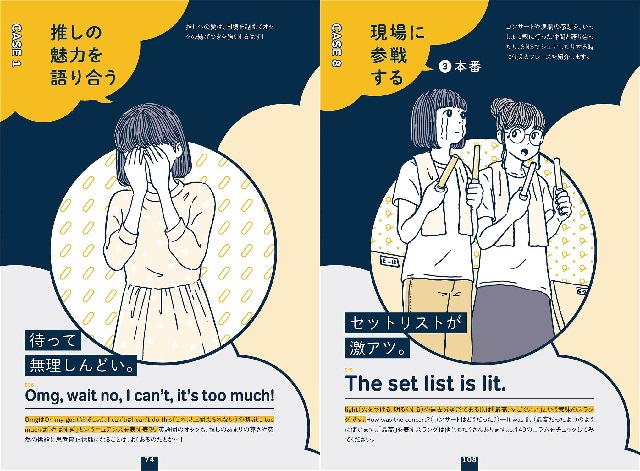
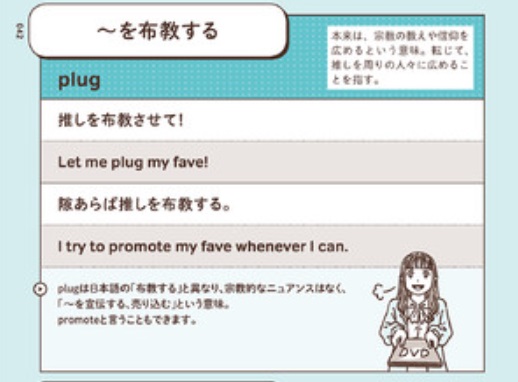
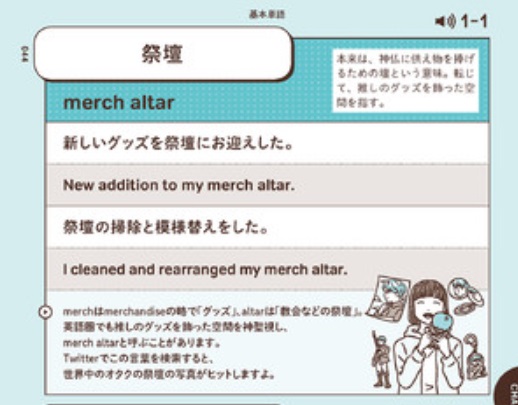
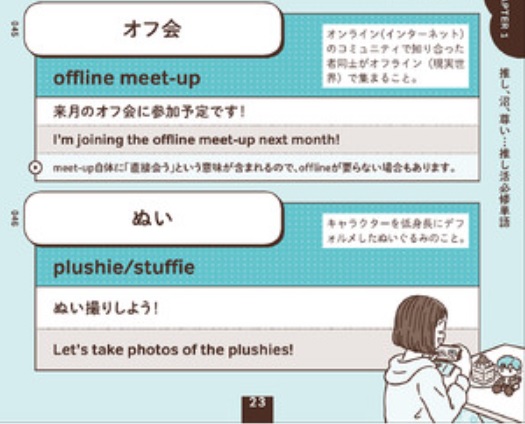
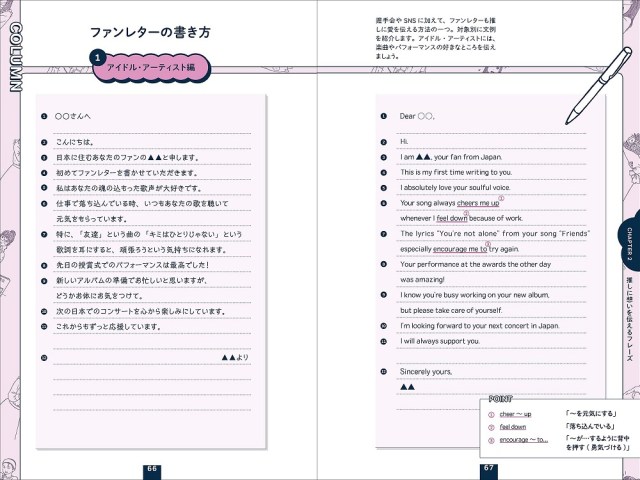
 Japanese karaoke rooms become live concert venues for otaku and oshikatsu
Japanese karaoke rooms become live concert venues for otaku and oshikatsu “Don’t worry, he is a docile pervert” and other useful phrases in Japanese and English
“Don’t worry, he is a docile pervert” and other useful phrases in Japanese and English Teaching English in Japan? New book helps students talk about the Illuminati, alien abductions
Teaching English in Japan? New book helps students talk about the Illuminati, alien abductions New book teaches Japanese people English to help out foreign travelers
New book teaches Japanese people English to help out foreign travelers Anime-style English textbook character who stole Japan’s heart now has her own calendar series
Anime-style English textbook character who stole Japan’s heart now has her own calendar series Starbucks Japan releases first-ever Hinamatsuri Girls’ Day Frappuccino
Starbucks Japan releases first-ever Hinamatsuri Girls’ Day Frappuccino Potama serves up epic rice balls like no other, and there’s only one store in Tokyo
Potama serves up epic rice balls like no other, and there’s only one store in Tokyo We try five menu recommendations from a clerk at CoCo Ichibanya and almost fall in love
We try five menu recommendations from a clerk at CoCo Ichibanya and almost fall in love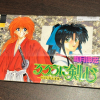 Creator of Rurouni Kenshin anime/manga admits to possession of child pornography
Creator of Rurouni Kenshin anime/manga admits to possession of child pornography Drift ice in Japan is a disappearing winter miracle you need to see now
Drift ice in Japan is a disappearing winter miracle you need to see now Can we be just like Shohei Ohtani on a budget with a Hello Kitty cap?
Can we be just like Shohei Ohtani on a budget with a Hello Kitty cap? KFC becomes KFCheese with new pie and raclette “drowning” burger in Japan
KFC becomes KFCheese with new pie and raclette “drowning” burger in Japan 7-Eleven Japan’s sakura sweets season is underway right now!
7-Eleven Japan’s sakura sweets season is underway right now! Mr. Sato visits newly opened gyoza restaurant, stuffs himself full of delectable dumplings
Mr. Sato visits newly opened gyoza restaurant, stuffs himself full of delectable dumplings Japanese women sound off on their minimum height requirements for a husband【Survey】
Japanese women sound off on their minimum height requirements for a husband【Survey】 Japanese restaurant chain serves Dragon Ball donuts and Senzu Beans this spring
Japanese restaurant chain serves Dragon Ball donuts and Senzu Beans this spring Highest Starbucks in Japan set to open this spring in the Tokyo sky
Highest Starbucks in Japan set to open this spring in the Tokyo sky Tokyo Skytree turns pink for the cherry blossom season
Tokyo Skytree turns pink for the cherry blossom season Japan Extreme Budget Travel! A trip from Tokyo to Izumo for just 30,000 yen [Part 1]
Japan Extreme Budget Travel! A trip from Tokyo to Izumo for just 30,000 yen [Part 1] Yakuzen ramen restaurant in Tokyo is very different to a yakuza ramen restaurant
Yakuzen ramen restaurant in Tokyo is very different to a yakuza ramen restaurant Japan has only one airport named after a samurai, so let’s check out Kochi Ryoma【Photos】
Japan has only one airport named after a samurai, so let’s check out Kochi Ryoma【Photos】 Japanese drugstore sells onigiri at pre-stupid era prices, but how do they compare to 7-Eleven?
Japanese drugstore sells onigiri at pre-stupid era prices, but how do they compare to 7-Eleven? Japan Extreme Budget Travel! A trip from Tokyo to Izumo for just 30,000 yen [Part 2]
Japan Extreme Budget Travel! A trip from Tokyo to Izumo for just 30,000 yen [Part 2] Adorable Totoro acorn key holders come with a special guest hidden inside[Photos]
Adorable Totoro acorn key holders come with a special guest hidden inside[Photos] Japan’s newest Shinkansen has no seats…or passengers [Video]
Japan’s newest Shinkansen has no seats…or passengers [Video] Starbucks Japan releases new sakura goods and drinkware for cherry blossom season 2026
Starbucks Japan releases new sakura goods and drinkware for cherry blossom season 2026 Foreigners accounting for over 80 percent of off-course skiers needing rescue in Japan’s Hokkaido
Foreigners accounting for over 80 percent of off-course skiers needing rescue in Japan’s Hokkaido Super-salty pizza sends six kids to the hospital in Japan, linguistics blamed
Super-salty pizza sends six kids to the hospital in Japan, linguistics blamed Starbucks Japan unveils new sakura Frappuccino for cherry blossom season 2026
Starbucks Japan unveils new sakura Frappuccino for cherry blossom season 2026 Foreign tourists in Japan will get free Shinkansen tickets to promote regional tourism
Foreign tourists in Japan will get free Shinkansen tickets to promote regional tourism The 10 most annoying things foreign tourists do on Japanese trains, according to locals
The 10 most annoying things foreign tourists do on Japanese trains, according to locals Take a trip to Japan’s Dododo Land, the most irritating place on Earth
Take a trip to Japan’s Dododo Land, the most irritating place on Earth Naruto and Converse team up for new line of shinobi sneakers[Photos]
Naruto and Converse team up for new line of shinobi sneakers[Photos] Is China’s don’t-go-to-Japan warning affecting the lines at a popular Tokyo gyukatsu restaurant?
Is China’s don’t-go-to-Japan warning affecting the lines at a popular Tokyo gyukatsu restaurant? Survey asks foreign tourists what bothered them in Japan, more than half gave same answer
Survey asks foreign tourists what bothered them in Japan, more than half gave same answer Japan’s human washing machines will go on sale to general public, demos to be held in Tokyo
Japan’s human washing machines will go on sale to general public, demos to be held in Tokyo Starbucks Japan releases new drinkware and goods for Valentine’s Day
Starbucks Japan releases new drinkware and goods for Valentine’s Day We deeply regret going into this tunnel on our walk in the mountains of Japan
We deeply regret going into this tunnel on our walk in the mountains of Japan Studio Ghibli releases Kodama forest spirits from Princess Mononoke to light up your home
Studio Ghibli releases Kodama forest spirits from Princess Mononoke to light up your home Major Japanese hotel chain says reservations via overseas booking sites may not be valid
Major Japanese hotel chain says reservations via overseas booking sites may not be valid Put sesame oil in your coffee? Japanese maker says it’s the best way to start your day【Taste test】
Put sesame oil in your coffee? Japanese maker says it’s the best way to start your day【Taste test】 No more using real katana for tourism activities, Japan’s National Police Agency says
No more using real katana for tourism activities, Japan’s National Police Agency says Japanese book “nekotan” teaches foreign language the best way possible: by talking about cats
Japanese book “nekotan” teaches foreign language the best way possible: by talking about cats Sumikko Gurashi origin book gets English/Japanese bilingual release, great for language learners
Sumikko Gurashi origin book gets English/Japanese bilingual release, great for language learners Newest tool to help Japanese people learn English: An all-English isekai light novel
Newest tool to help Japanese people learn English: An all-English isekai light novel English textbook characters get anime-style makeover to appeal to linguists and otaku alike
English textbook characters get anime-style makeover to appeal to linguists and otaku alike Beautiful anime fantasy mom is now teaching Japanese people how to speak English
Beautiful anime fantasy mom is now teaching Japanese people how to speak English New English textbook published for anime industry’s Animator Skill Test
New English textbook published for anime industry’s Animator Skill Test “We wasted so much time in English class” — Japanese Twitter user points out major teaching flaw
“We wasted so much time in English class” — Japanese Twitter user points out major teaching flaw English conversation school in Japan has clever reminder that students don’t have to be perfect
English conversation school in Japan has clever reminder that students don’t have to be perfect New English textbook for Japanese learners is completely full of crap, looks pretty useful
New English textbook for Japanese learners is completely full of crap, looks pretty useful Anime-style isekai story is actually an English-learning textbook from Japan’s public broadcaster
Anime-style isekai story is actually an English-learning textbook from Japan’s public broadcaster The anime girl English teacher textbook character that stole Japan’s heart has gotten a promotion
The anime girl English teacher textbook character that stole Japan’s heart has gotten a promotion The science behind why English speakers can’t pronounce the Japanese “fu”
The science behind why English speakers can’t pronounce the Japanese “fu” English pick-up lines: Foreign writer shares his advice with amorous Japanese men
English pick-up lines: Foreign writer shares his advice with amorous Japanese men What’s wrong with English education in Japan? Pull up a chair…
What’s wrong with English education in Japan? Pull up a chair… Learn English with Assassination Classroom
Learn English with Assassination Classroom